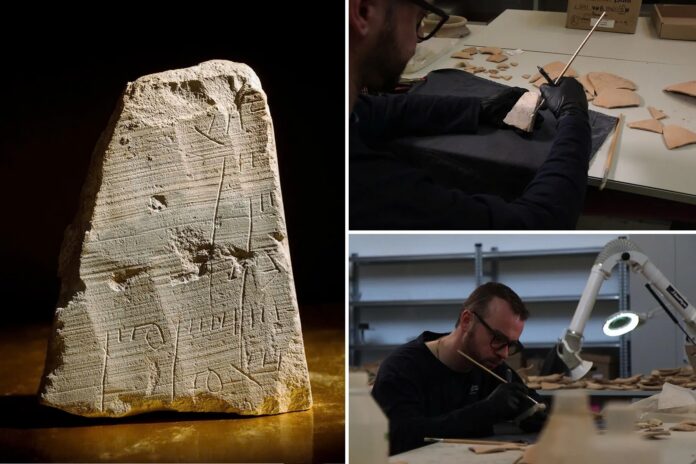2,000-Year-Old Stone Tablet Discovered on Historic Pilgrimage Road

In a remarkable archaeological find, a 2,000-year-old financial record has been unearthed along the ancient Pilgrimage Road in Jerusalem’s City of David. This discovery offers a fascinating glimpse into the daily lives and commercial activities of Jerusalem’s inhabitants during the Second Temple period.
A Window into Ancient Commerce
The small stone tablet, likely serving as a receipt or payment instruction, features seven partially preserved lines of text. Hebrew names, letters, and numbers adorn the surface, painting a picture of a bustling commercial center. The name “Shimon” appears prominently, accompanied by symbols representing monetary values.

Unique Among Jerusalem Finds
While similar inscriptions have been found in the region, this is the first of its kind discovered within Jerusalem’s ancient city limits. The tablet’s presence on the Pilgrimage Road – the main thoroughfare connecting the City of David to the Second Temple – underscores the area’s importance as both a religious and commercial hub.
From Ancient Graves to City Streets
Intriguingly, the stone slab appears to have been repurposed from an ossuary, a burial chest common in Jerusalem during the Early Roman period. Its presence within the city suggests a thriving trade in these artifacts, possibly crafted by local artisans.
Bridging Past and Present

Rabbi Amichai Eliyahu, Israel’s Minister of Heritage, emphasized the significance of the find: “This remarkable discovery uncovers another aspect of Jewish life in Jerusalem from 2,000 years ago, positioning the City of David as a pivotal center in the Jewish people’s global historical narrative.”
Modern Echoes in Ancient Practices
The use of receipts for commercial transactions 2,000 years ago bears a striking resemblance to modern business practices. This continuity across millennia highlights the enduring nature of human commerce and record-keeping.
Ongoing Revelations on the Pilgrimage Road
Eli Escusido, director of the Israel Antiquities Authority, describes the Pilgrimage Road excavations as a “flagship project.” He notes, “With every discovery, our understanding of the area deepens, revealing this street’s pivotal role in the daily lives of Jerusalem’s inhabitants 2,000 years ago.”

As archaeologists continue to unearth treasures along this ancient thoroughfare, each artifact helps to paint a more vivid picture of life in Second Temple-era Jerusalem. The financial record stands as a testament to the city’s rich history and its longstanding role as a center of commerce and culture in the region.

